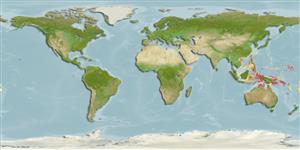Teleostei (teleosts) >
Gobiiformes (Gobies) >
Gobiidae (Gobies) > Gobiinae
Etymology: Eviota: No etymology given, suggested by Christopher Scharpt: from Latin 'eu' for 'true' and 'iota' for anything very small, in combination 'truly very small' referring to it as being the smallest vertebrate at the time it has benn described by Jenkins (thus, making the suggestion by Scharpt plausible.; piperata: Name from Latin 'piper' for pepper; referring to the heavy peppering of melanophores on its head and all over its body (Ref. 94781).
Environment: milieu / climate zone / depth range / distribution range
Ecology
Marine; pelagic-neritic; depth range 6 - 9 m (Ref. 94781). Tropical
Western Pacific: Palau south to Indonesia (Raja Ampat and the Moluccas), north to Taiwan, including Papua New Guinea; South China Sea to the Philippines Islands (Apo Reef, Mindoro Province, outside of the Sulu Sea).
Size / Weight / Age
Maturity: Lm ? range ? - ? cm
Max length : 2.0 cm SL male/unsexed; (Ref. 94781)
Short description
Identification keys | Morphology | Morphometrics
Dorsal spines (total): 7; Dorsal soft rays (total): 8; Anal spines: 1; Anal soft rays: 8; Vertebrae: 24. This species is distinguished by the following characters: cephalic sensory-pore system categorized as Group II or without the IT pore, and a varied POP from being both absent to lacking only the upper or lower pore; 8/8 dorsal/anal-fin formula; some branched pectoral-fin rays; absence of dark spot on ural centrum; male genital papilla without fimbria; cheek and rest of body densely peppered with chromatophores (Ref. 94781)
Found to be abundant in small coral limestone islands, with small shallow lagoons and steep outer slopes to deepwater, on submerged volcanic peaks (Ref. 94781).
Life cycle and mating behavior
Maturities | Reproduction | Spawnings | Egg(s) | Fecundities | Larvae
Greenfield, D.W. and R. Winterbottom, 2014. Eviota piperata, a new gobiid species from Palau (Teleostei: Gobiidae). Zootaxa 3755(3):295-300. (Ref. 94781)
IUCN Red List Status (Ref. 130435)
Threat to humans
Harmless
Human uses
Tools
Special reports
Download XML
Internet sources
Estimates based on models
Preferred temperature (Ref.
123201): 28.8 - 29.4, mean 29 °C (based on 215 cells).
Phylogenetic diversity index (Ref.
82804): PD
50 = 0.5000 [Uniqueness, from 0.5 = low to 2.0 = high].
Bayesian length-weight: a=0.00708 (0.00333 - 0.01504), b=3.09 (2.92 - 3.26), in cm total length, based on LWR estimates for this (Sub)family-body shape (Ref.
93245).
Trophic level (Ref.
69278): 3.0 ±0.3 se; based on size and trophs of closest relatives
Resilience (Ref.
120179): High, minimum population doubling time less than 15 months (Preliminary K or Fecundity.).
Fishing Vulnerability (Ref.
59153): Low vulnerability (10 of 100).
